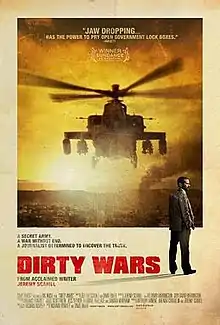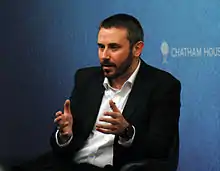Dirty Wars
Dirty Wars is a 2013 American documentary film, which accompanies the book Dirty Wars: The World Is a Battlefield by Jeremy Scahill. The film is directed by Richard Rowley, and written by Scahill and David Riker.
| Dirty Wars | |
|---|---|
 Theatrical release poster | |
| Directed by | Richard Rowley |
| Produced by | Anthony Arnove Brenda Coughlin Jeremy Scahill |
| Written by | Jeremy Scahill David Riker |
| Based on | Dirty Wars: The World Is a Battlefield by Jeremy Scahill |
| Narrated by | Jeremy Scahill |
| Music by | David Harrington |
| Cinematography | Richard Rowley |
| Edited by | Richard Rowley |
| Distributed by | Sundance Selects |
Release date |
|
Running time | 86 minutes[1] |
| Country | United States |
| Language | English |
| Box office | $371,245[2] |
Production
Production for the film began in 2010 when Scahill, who worked as a reporter for The Nation magazine, traveled to Afghanistan with director Richard Rowley, with only a vague idea for what the film would be about; they only decided upon the subject matter after investigating a series of night raids carried out by the Joint Special Operations Command (JSOC).[3] The film had no budget, and at the outset Scahill and Rowley traveled to Afghanistan using money from a grant Scahill had received to support his reporting.[4]
Initially the film was not intended to have Scahill as a narrator or protagonist, instead acting as a "tour guide" as the film traveled between the sites of covert U.S. military action.[5] David Riker was brought on board to assist with writing after an initial four-hour rough cut of the film was put together, and he convinced Scahill and Rowley to make the film more personal.[6]
During filming, Scahill and Rowley traveled to Somalia to meet warlords in different territories of the country. As no American insurance companies would cover them to travel there, they had to get kidnap and ransom insurance from another country.[6]
Synopsis
Investigative journalist Jeremy Scahill travels to Afghanistan, Yemen, Somalia, and other countries where the United States has taken military action in the War on Terror. In Afghanistan, he investigates the United States military and government cover-up of the deaths of five civilians, including two pregnant women killed by US soldiers from the Joint Special Operations Command. After investigating the attack, Scahill travels to other sites of JSOC intervention, interviewing both proponents and opponents, and the survivors, of such raids,[7] including U.S. Senator Ron Wyden.[8]
Scahill also investigates the assassinations of American citizens Anwar al-Awlaki and his son Abdulrahman al-Awlaki,[4] meeting with their family at their home in Yemen. Scahill suggests that the War on Terror is in fact a "self-fulfilling prophecy" and causes the radicalization of Muslims.[5] He also discusses the case of Yemeni investigative journalist Abdulelah Haider Shaye who was detained, tried and sentenced on terrorism-related charges after reporting on American drone strikes.[4]
Release

Dirty Wars premiered at the 2013 Sundance Film Festival on January 18, 2013. The film competed in the U.S. documentary section,[9] and it won the Cinematography award.[10]
The film was released in four theaters in New York City, Los Angeles, and Washington, DC on June 7, 2013. Over the opening weekend, it grossed an estimated $66,000, a theater average of $16,500.[9] The film opened in British cinemas on November 29, 2013 with showings in nine cities around the country.[11]
Reception
Critical reception
Dirty Wars received critical acclaim. Review aggregation website Rotten Tomatoes certified the film as "fresh" with a score of 85% based on 71 reviews, and an average rating of 7.40/10.. The website's critical consensus reads, "Some viewers may find fault with director Rick Rowley's filmmaking methods, but they aren't distracting enough to keep Dirty Wars from serving as a terribly compelling argument against elements of American foreign policy.".[12] Metacritic rated the film 76 based on 18 reviews, indicating "generally favorable reviews".[13] The film obtained a high score of 7.5 out of 10 from the aggregation of more than 6000 votes at the Internet Movie Database.[14]
Trevor Johnston found the film to be a "gripping investigative doc, which plays out like a classic conspiracy thriller as it follows a trail of clues to the heart of darkness behind President Obama’s good-guy facade. Scahill may not have the screen charisma of a Hollywood leading man, but he has the integrity to keep on pushing at closed doors even after threats are made to his personal security. He also widens his focus to include Yemen and Somalia and draws a pattern of state-sanctioned assassination by unchecked US special forces and their mercenary hirelings."[15]
However, Douglas Valentine wrote "...the film is so devoid of historical context, and so contrived, as to render it a work of art, rather than political commentary. And as art, it is pure self-indulgence."[16] Some reviewers criticized the film's focus on Scahill rather than on the issues he covers. Ella Taylor said that "as a journalist Scahill is surely the messenger, not the subject, and the attention he receives in Dirty Wars distracts us from the bigger picture he paints."[17]
Accolades
Dirty Wars was nominated for a 2013 Academy Award for Best Documentary Feature.[18] Christopher Barnett (Sound Designer at Skywalker Sound) won the 2014 Golden Reel Award for Best Sound Editing: Sound Effects, Foley, Dialogue, ADR and Music in a Feature Documentary, given by the Motion Picture Sound Editors society.[19] The film was also nominated for Best Documentary Screenplay from the Writers Guild of America.[20]
See also
References
- "DIRTY WARS (15)". BRITDOC Films. British Board of Film Classification. September 10, 2013. Retrieved September 10, 2013.
- "Dirty Wars (2013)". Box Office Mojo. 2013-08-04. Retrieved 2013-08-07.
- Moss, Stephen (November 24, 2013). "Jeremy Scahill: the man exposing the US Dirty War". The Guardian. Guardian Media Group. Retrieved August 2, 2014.
- Stuart, Tessa (June 10, 2013). "Jeremy Scahill's "Dirty Wars" And The Very Dark Side Of American Military Intervention". BuzzFeed. Retrieved August 2, 2014.
- Egner, Jeremy (June 6, 2013). "His Target Is Assassinations". The New York Times. The New York Times Company. Retrieved August 2, 2014.
- Ingersoll, Geoffrey; Kelley, Michael B.; Jones, Brian (July 16, 2013). "Jeremy Scahill Tells Us How He Uncovered America's Massive, Global Dirty Wars". Business Insider. Retrieved August 2, 2014.
- "About the Film". dirtywars.org. Archived from the original on December 3, 2016. Retrieved June 10, 2013.
- O'Hehir, Andrew (June 9, 2013). "Obama's "Dirty Wars" — and a soiled presidency". Salon. Retrieved August 17, 2014.
- Cunningham, Todd (June 9, 2013). "Independent Box Office: Joss Whedon's 'Much Ado About Nothing' a Record-Breaker". The Wrap. Retrieved June 10, 2013.
- Staff (January 26, 2013). "Sundance 2013: Festival Awards Announced". The Hollywood Reporter.
- "Dirty Wars film: Screenings 29 November - 11 December". Stop the War Coalition. December 2, 2013. Archived from the original on August 19, 2014. Retrieved August 17, 2014.
- "Dirty Wars (2013)". Rotten Tomatoes. Retrieved December 4, 2013.
- "Dirty Wars Reviews". Metacritic. Retrieved December 4, 2013.
- "Dirty Wars (2013)". Internet Movie Database. Retrieved June 14, 2015.
- "Dirty Wars". Time Out London. Retrieved 2018-03-16.
- Valentine, Douglas (June 7, 2013). "Dirty Wars and Self-indulgence". Dissident Voice. Retrieved 12 September 2013.
- Taylor, Ella (June 6, 2013). "Covert Conflicts, Decried In 'Dirty Wars'". National Public Radio. Retrieved 10 October 2014.
- "Nominees for the 86th Oscars". oscars.org. Retrieved January 16, 2014.
- 2014 Golden Reel Award Winners: TV/Feature Animation & Documentary Category Archived October 6, 2014, at the Wayback Machine
- "'Captain Phillips,' 'Her' Win Top Screenplay Awards". variety.com. Variety. 1 February 2014. Retrieved 18 February 2019.